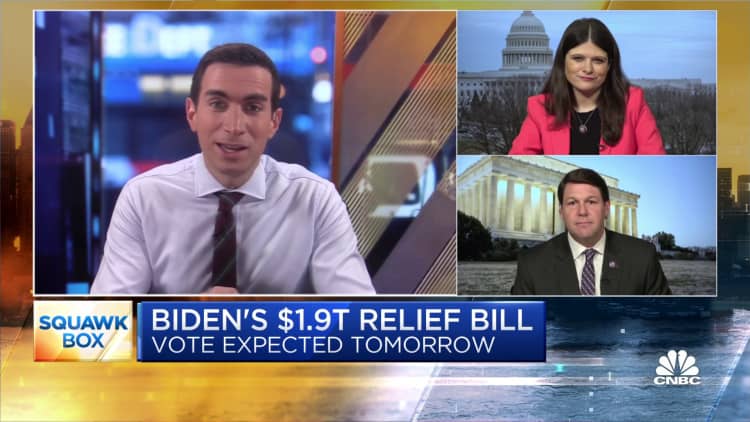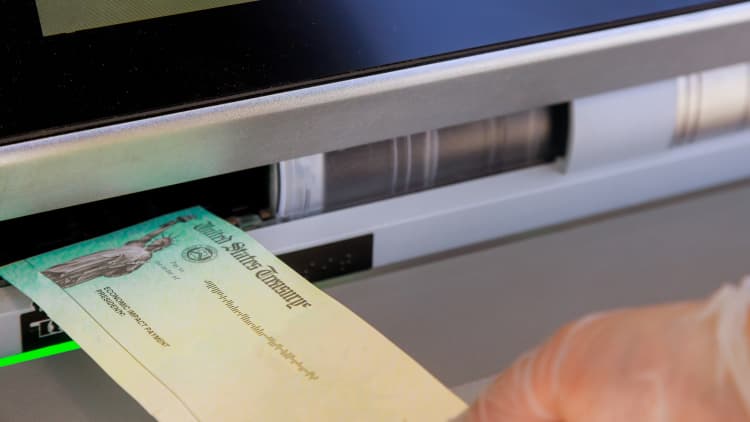As Congress works to finalize its latest coronavirus relief bill, some American families are poised to receive a financial windfall.
Between new $1,400 stimulus checks and an enhanced child tax credit, that could add up to more than $14,000 for some families.
"All of the focus has been on the $1,400 when, in reality, for a family of four, they should be focused on the $14,000," said Ed Mills, Washington policy analyst at Raymond James. Mills wrote about the potential income boost this week.
The new stimulus checks would provide $1,400 per person, including child and adult dependents.
More from Personal Finance:
Lawmakers question whether new child tax credit is too much or too little
Still no stimulus check? What that means for your tax return this year
Small business owners confused by PPP rules as priority window opens
Like the previous direct payments, they would be based on certain income thresholds. So married couples who file jointly with up to $150,000 in income would be eligible for the full amount.
For a family of four with under $150,000 in income, that would amount to $5,600 in new stimulus check money on top of the $2,400 they received in January ($600 per person), for $8,000 total. Provided the bill moves as scheduled, that deposit could come in late March, according to Mills.
Then, the expanded child tax credit could provide an additional $6,000 to $7,200 per family.
Currently, families receive $2,000 per child under 17, so long as their income is under $200,000 for individuals or $400,000 per married couple.
The new proposal calls for raising those sums to $3,600 per child up to age 6, and $3,000 for those ages 6 to 17, for married couples with under $150,000 in income.

The new plan would also enable families to receive the child tax credit payments monthly. Starting in July, they could receive up to $300 per month for children up to age 6 and $250 per month for children 6 through 17.
Altogether, that would add up to more than $14,000 for a family of four. This excludes enhanced federal unemployment benefits, if they qualify. The new coronavirus package aims to provide an additional $400 per week to jobless workers. That's compared to the $600 per week Congress authorized a year ago, and the extra $300 per week that expires in March.
The additional financial help is aimed at helping individuals and families get through the Covid-19 pandemic.
But it is also reconfiguring the social safety net, according to Mills.
"A test of universal basic income has arrived in the United States," he wrote this week.

Universal basic income gives people a stipend to live on. The concept began getting more attention in 2019 when Andrew Yang, then a Democratic candidate for president, called for sending people $1,000 per month.
The proposal brought universal basic income into the mainstream conversation and away from the fringe.
"There was a clear constituency there for this," Mills said.
Then, when the Covid-19 pandemic set in, providing additional income through stimulus checks, unemployment insurance and now the child tax credit became one of the tools that were used.
"In the financial crisis, Democrats felt as if they ultimately did too little," Mills said. "Here they've decided they want to err on the side of doing too much."
That's not necessarily true of Republicans, who questioned the extra unemployment benefits, which represented the first part of an experiment with universal basic income last March, Mills said.
In the financial crisis, Democrats felt as if they ultimately did too little ... Here they've decided they want to err on the side of doing too much."Ed MillsWashington policy analyst, Raymond James
The party's stance was complicated by support from former President Donald Trump, a Republican, for providing families with additional income through jobless benefits and stimulus checks.
"I do expect to see going forward Congressional Republicans having a more traditional Republican view on some of these programs and being less supportive," Mills said.
One exception is Utah Republican Sen. Mitt Romney's child tax credit proposal, which also calls for providing families with monthly income.
Now that the experiments have been put in place, one looming question is how long the financial support will last.
"What we see in D.C. is that, once the toolkit has been expanded, once a federal benefit has been established, it's very difficult to walk that back," Mills said.
One provision most likely to get extended could be the child tax credit, according to Mills. Democrats' current plan would expand that for just one year.
"This has all the workings of trying to be a test run for something more permanent," Mills said.



